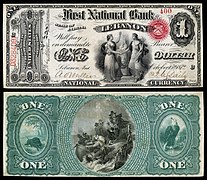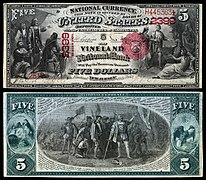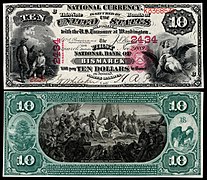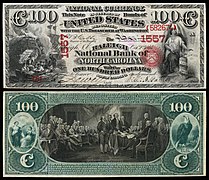Template:POTD/2022-09-28
-
$1 (original): First National Bank, Lebanon, Indiana
-
$2 (1875): First National Bank, Emporia, Kansas
-
$5 (1875): Vineland National Bank, Vineland, New Jersey
-
$10 (1875): First National Bank, Bismarck, North Dakota
-
$20 (1875): First National Bank, Butte, Montana
-
$50 (1875): First National Bank, Cleveland, Ohio
-
$100 (original): Raleigh National Bank, Raleigh, North Carolina
-
$500 (original): Appleton National Bank, Lowell, Massachusetts
-
$1000 (1875, proof): First National Bank, Salem, Massachusetts
National Bank Notes were United States banknotes issued by national banks chartered by the U.S. federal government. The banknotes were usually backed by bonds deposited by the bank with the United States Treasury. In addition, banks were required to maintain a redemption fund amounting to five percent of any outstanding note balance, in gold or "lawful money". The banknotes were not legal tender in general, but were satisfactory for nearly all payments to and by the federal government. They were retired as a currency type by the federal government in the 1930s, when United States currency was consolidated into Federal Reserve Notes, United States Notes, and silver certificates. These nine banknotes, in denominations from $1 to $1000, were issued by various banks across the country as part of either the original or the 1875 series of National Bank Notes.Banknote design credit: Office of the Comptroller of the Currency and the Bureau of Engraving and Printing; scanned by Andrew Shiva









